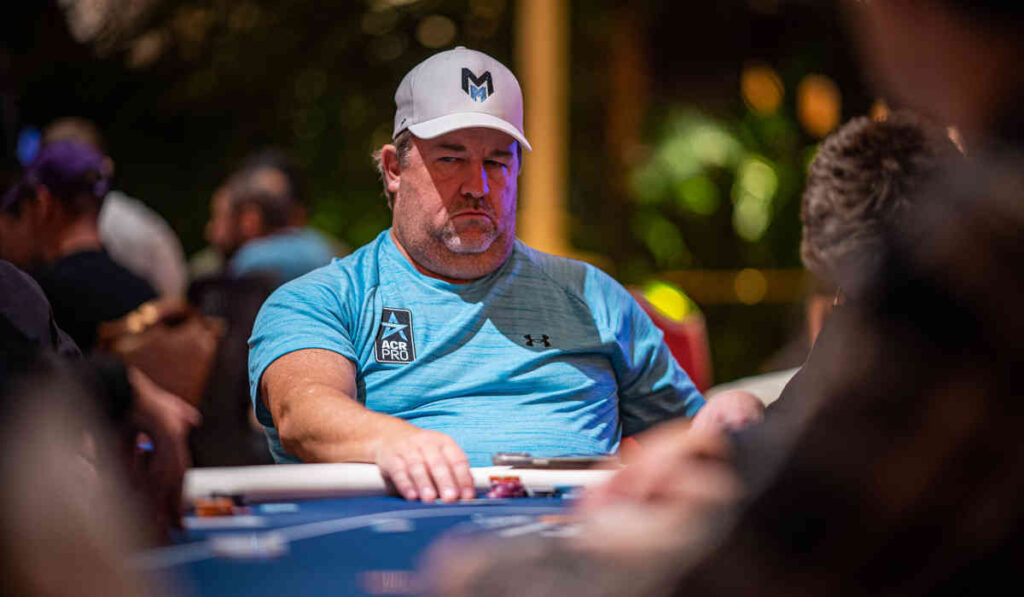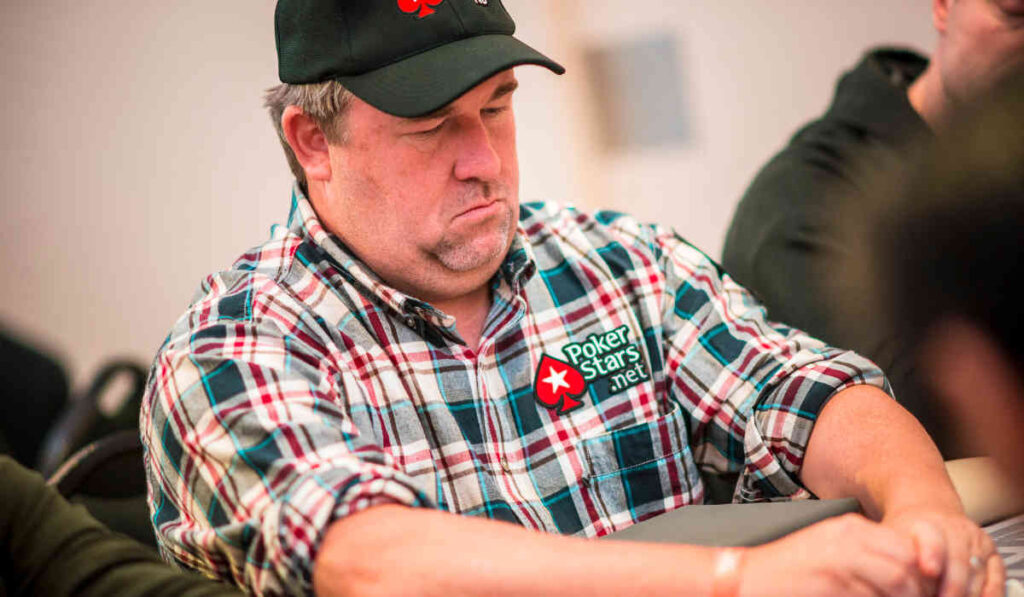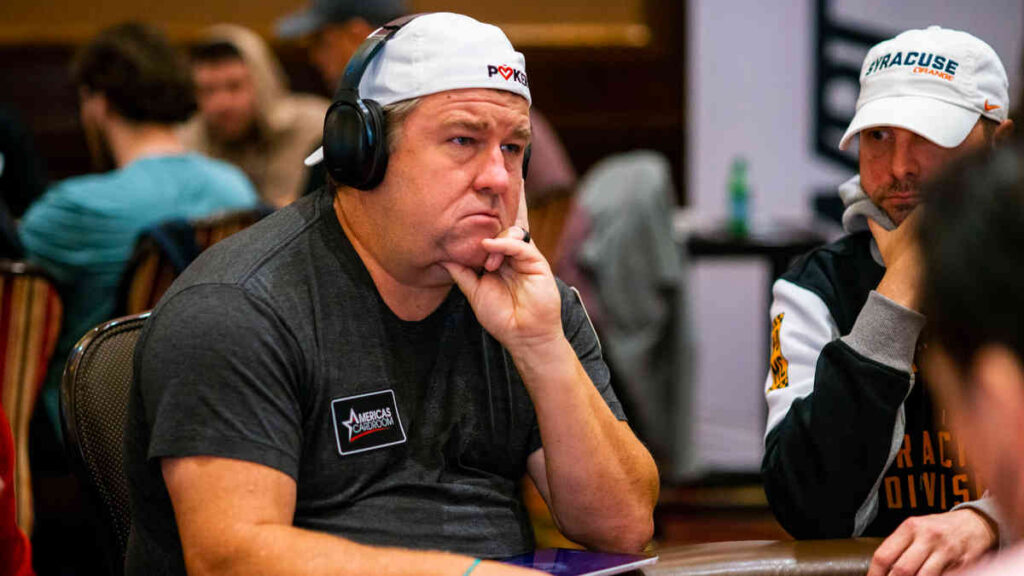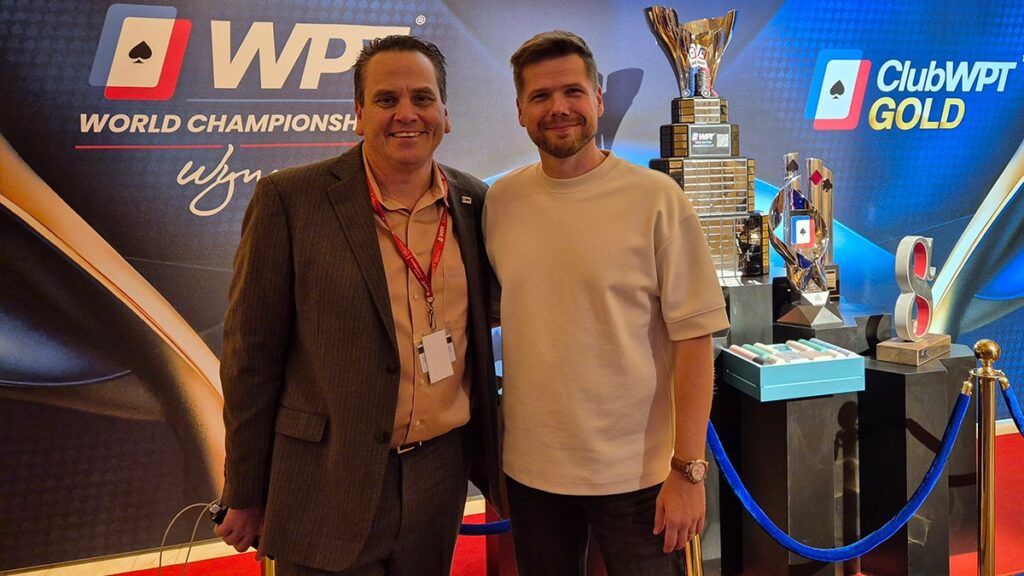Images courtesy of World Poker Tour
Every game has its turning point—Chris Moneymaker was poker’s. In this edition of Inside the Poker Circles, drawn from Between the Blinds: Introducing Poker Professionals by Sara O’Connor (coming this fall), we sit down with the man whose unlikely 2003 WSOP Main Event victory didn’t just change his life—it changed the entire poker world.
By turning a $39 online satellite into a $2.5 million payday, Moneymaker proved that the dream was real, and anyone could go from everyday player to world champion.
His win ignited what would become known as the “Moneymaker Effect”, fueling a global poker boom and inspiring a new generation to hit the felt.
In this interview, Chris reflects on his rise from accountant to icon, the pressure and privilege of his place in poker history, and how the game continues to shape his life more than two decades later. This is Inside the Poker Circles.
Do you remember your first time playing? If so, what was it like?
I do. My first time playing No Limit Texas Hold’em was in an old, beat up used trailer on a car lot. The players there were telling me how good I was, and I made $1,900 that night. For me, that was probably the biggest win in anything I had ever done. It was really enjoyable.
The week after, I went back. One guy bet me there’d be a nine, deuce, or jack on every flop, and I lost most of my winnings from the previous week. I got hustled the second time I went to that place, but it was a good learning lesson.
What’s it like being known as the one who caused a poker boom?
Honestly, 99.9% of the time, you don’t think of it. You live your everyday life. When you do an interview or go to the WSOP or some random place and they recognize you, it’s a little surreal.
You get reminded that a lot of poker today is attributed to the success you had and how you responded to that success.
It’s obviously very rewarding sometimes. I guess it’s a unique situation. But most of the time, I’m a random dad, a random guy. I don’t look to be recognized. I try to blend in and do my thing.
I have the perfect amount of celebrity status – if I want to get recognized, I go to a poker room; if I don’t, I go anywhere else.
Do you ever drink or smoke when playing? If so, how, if at all, does it affect your game?
I used to do both (cigarettes, not weed), and I’ve had my biggest winning session when I was drinking. Drinking would almost heighten my senses. I haven’t had either in years now.
I got to a point in my life that waking up with a hangover just hurt. At a certain point, your body hates it. Last time I drank, it was like I had the flu for three days, so those days are behind me.
How do you not let past success affect your current play?
In the past, I definitely did. When I won the Main Event, I also got second in the WPT. I fell into a trap thinking that I was the best player in the world.
I thought I didn’t need to study or work on my game. I felt like that for many years, and when I was losing, I believed my losses were due to variance and running bad. My early successes caused me to be overconfident and overestimate my abilities.
It’s typical for a poker player when they’re winning to think, “I’m the best.” When they’re running bad, it’s typical to think, “Oh my aces got cracked; it’s not my fault.”

We remember good plays, and if we get beat, we generally remember it to be a bad beat, even if it might not have been.There are not many times where I go on a massive downswing in cash games; it’s very rare that I lose four sessions in a row.
When you go on a losing period, do you begin to question if you still have an edge? What do you do to re-prepare yourself for next time?
I’ve been doing the game long enough. I know I’m one of the better players out there. I know I table select well. I almost always have a really good feeling about where my opponents are.
Once you have their range down and predict their range confidently, you don’t really worry. If I wake up one day and think this guy has range “X” and he shows up with range “Y” consistently, I might question what I’m missing and reevaluate my game process.
At the end of the day, if I make a play and lose, I normally have a good justification for my play. That gives me confidence. If I can put someone on a range as we go into the river, I’m not worried about my game slipping or falling behind the curve too much.
What skills do you believe are crucial for a poker player to be successful, based on your observations and/or experiences?
You gotta be perceptive and understand what people are thinking. You have to be willing to risk it all but also be disciplined enough to play in games you can afford. It takes a balanced person that has a messed-up mind.
Usually, people who are bankroll-oriented don’t have the ability to go crazy and risk everything and bluff, and vice versa. It doesn’t sound like that big of a deal, but it’s a big skillset to have.
You also have to have a good memory. For example, I played with a guy in Australia and he did something at the final table that I observed. The next year, we’re at the final table again and I observe it again. So, I folded. He grimaced and said, “You remembered from last year.” He was right; I did.
Another time, I’m playing Day 1 in a big field tournament, and the guy says, “I have my favorite hand” and he revealed 5/6. Fast forward to the next day, towards the middle of the day, and we’re placed at the same table. Once again, he says, “I’ve got my favorite hand.”
And I wonder to myself if it’s 5/6, such that he missed his draw. Welp, he had 5/6 again and I won. I didn’t make a big deal of it, but I remembered he said it the other day and made a play accordingly.
Do you have any pre- or post-game rituals you practice?
After the Main Event when I didn’t win, I went to my room and cried (laughs).
Honestly, I don’t have many rituals. I’ll go through phases where I’m trying to take care of my health. During those times, I’ll get up and go to the gym and do things to be healthier.
There will be other phases where I’m a lazy, fat slob, where I’ll sleep all day until the tournament. This year, after the WSOP, I’m trying to get back into shape. It depends on what cycle or mode I’m in.
When did you feel ready to call yourself a poker professional?
February of 2004, because I quit my job. I got second place in the second event I was playing, and I was getting enough from endorsements and playing, so I decided to go pro.
That’s all you have to do to be a poker professional. It’s the easiest barrier of entry to overcome. If you have no other form of profession, then you’re a poker pro.
Do you notice a difference when you play against women?
I mean you always will notice a little difference, especially at the level I play at. Generally, they’re going to be very accomplished and good. I can’t believe I’m going to say this, but they’re going to be better than most guys. Women are more even keel and perceptive than men.
Whenever I play a woman in a $10,000 event, you know she’s good. In comparison to the guys, some of them are skilled and some of them are fish.
I haven’t seen a terrible woman playing in these $10,000 or higher events, so my default thinking about her is that she’s competent and knows what she’s doing. If she’s dealt with all the BS to get this far, I know she’s going to be good.
If I’m playing against a woman in a smaller event, I basically study her like I would do any other player. Sometimes, they’re going to be meeker, especially some of the newer players, but that’s typical of any new player.
Do you do anything to help bring more women into the game? If so, what?
We always try to have women’s events. We’ve talked about having a woman’s event during the Moneymaker Tour for women who have never played poker before.
When we get the social club’s kitchen open, if you’ve never played before, we have a place to teach you how to play if you’re a woman. We’re going to start from scratch, and there will be a $1,000 freeroll. Hopefully, they’ll come to our room more frequently afterwards.
What I’ve generally found is that the majority of women don’t get involved for several reasons. For example, the barrier for entry is very uncomfortable. The majority of players are male, and it’s uncomfortable for a woman to come in and sit with a bunch of guys.
This is a brand-new market and something new. We’ve tried to break into it. Women don’t have the egos that men do, and they don’t have the desire to gamble like men do. If Kristen Foxen had won the WSOP Main Event, it would have made my life easier. Maybe next year!
I taught my wife how to play 20 years ago, because she wanted to know what I do. We started playing an online tournament. After about 15 minutes, she asked, “How do we quit; this is boring.”
But I said, “You have to finish, or you have to go bust”, so she said, “I want to bust” and she has only played once since. The one night she did play cards, she cracked my pocket jacks with pocket queens, which she never lets me forget.
How do you see technology (like RFID cards or online platforms) impacting the future of live poker?
It’s already impacted poker in such a dramatic way. Online poker was just starting when I won. I was wearing a PokerStars patch back then, and they considered me a second-rate player, because I played online. Online players weren’t respected. It was thought that poker is a face-to-face game.
Obviously, as the years progressed, online poker players are now considered to be superior players to live players. Online poker speeds up the learning curve.

Back in Doyle’s day, you had to sit and play hands. Now there are solvers and there is so much information out there that you can really sit down and learn how to play the game in a short amount of time.
The learning curve to get into poker has changed dramatically. Every year the game gets harder and harder because of the tools players can utilize.
If a player exposes their cards, do you use that to your advantage?
I don’t know how you couldn’t use that to your advantage. Between card removal and knowing two extra cards, you have a huge advantage. You can’t lose.
If the guy flips over two aces accidentally, and you have an ace in your hand, obviously your hand is affected dramatically.
Yeah, seeing someone’s hand is going to affect how you play your hand. Hell, if I have pocket 3s and a three is exposed, I go from set mining to throwing my hand into the muck like that (snaps fingers).
How, if at all, does having such a big social media following affect your play?
It used to affect my play. I wanted to not make mistakes. I didn’t want people to make fun of me or think I was bad at poker.
After you win the WSOP as an amateur, everyone thinks you’re terrible. They’re always going to criticize you even if you play perfect poker for 10 hours and make one mistake at the end.
You become the worst player ever in the masses’ minds, because of one mistake. That bothered me for a couple years. Your mistake is all people remember.
Over time, you learn that you don’t care what people think. You make the best decisions in the heat of the battle; most people can’t put themselves in your shoes. They haven’t been sitting at the table studying your opponents.
A lot of plays will make you look like an idiot or a genius. When you’re first starting out and have a following, you get a bit self-conscious, but as you get more involved in poker and more experienced, you don’t care.
During the WSOP in 2024, I ended up losing a massive hand when I shoved on the river. I didn’t think about it at the time, and I put my hand down and mucked my hand.
My opponent was all-in, so, in theory, I was supposed to show my hand. I just folded my hand like normal, and someone said, “You have to expose your hand.”
The dealer tried to retrieve my hand and pulled out a hand that wasn’t mine and exposed it. We just moved on like nothing happened, but Poker News reported the incorrect hand.
They DMed me, asking, “Do you want to go on record with what your holding was?” and I said, “No, that’s fine; just leave it.” I would rather people think I’m playing like an idiot.
I learned over a period of time that playing like an idiot isn’t a bad thing – you get more action and you get invited to games. When I worried about what people thought, that was early in my career.
One of the worst things you can be in poker is a super star, because people don’t want to play with you. It’s always better to be the fish.


